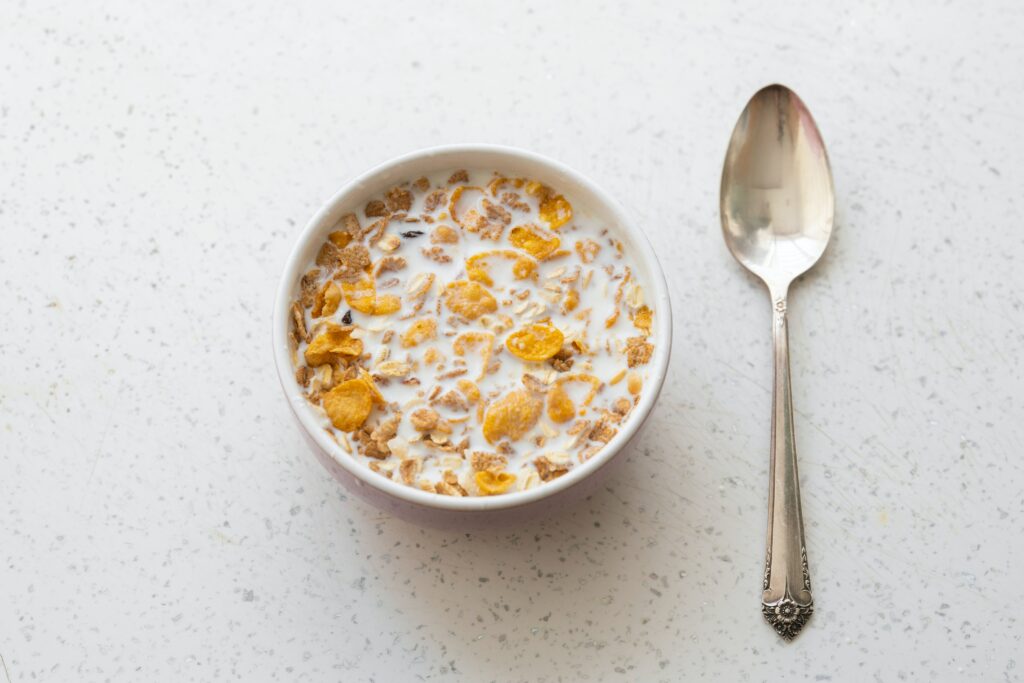In a world where wellness trends reign supreme, oat milk has emerged as a shining star among plant-milk alternatives. Its creamy texture, nutty flavor, and perceived health benefits have swiftly propelled it to nationwide coffee shops and grocery stores, alike. But behind its popularity lies a quiet truth: oat milk may not be the nutritional superhero it claims to be. Is this well-known dairy substitute worth the hype? To get the facts straight, we’re uncovering oat milk dangers. Of course, if you love oat milk and tolerate it well, there’s no need to quit it. Rather, my goal is to share health data in a way that feels empowering. This is simply information, and you can choose what to do with it.

What is oat milk?
Let’s start here. Oat milk is a plant-based milk alternative with a devote following. Made from blending soaked oats with water, oat milk offers a creamy consistency and a mild, slightly sweet taste. Depending on the brand, it’s often fortified with vitamins and minerals to mimic the nutritional profile of cow’s milk. With its dairy-free, lactose-free, and vegan attributes, oat milk has become a go-to option for those seeking an alternative to traditional dairy products. Like with cow’s milk, it’s super versatile: you can add it to coffee, smoothies, cereal, and baked goods.
pros and cons of oat milk
Unfortunately, oat milk is one of those drinks that the diet industry (and wellness influencers!) has convinced us is quite nutritious. When in reality, there are oat milk dangers to keep in mind. What are oat milk’s pros and cons?
Pros
- Similar to cow’s milk, it has a thick consistency.
- Neutral taste (unless you buy it sweetened or with vanilla flavoring).
- High in fiber.
- One of the most sustainable plant-based milks.
- Free of lactose, nuts, and soy (for those with allergies).
Cons
- For those with celiac disease, not all oat milk is gluten-free.
- Most boxed oat milk contains inflammatory oils.
- It includes the highest carbohydrate content among all plant-based milks.
- Compared to other plant-based milk, oat milk spikes blood sugar.
- One cup of oat milk contains around seven grams of added sugars.
- Some brands use artificial fillers and preservatives, which can have adverse health effects.

oat milk and blood sugar
Keeping blood sugar stable is foundational when it comes to short-term and long-term health. And unfortunately, far too many foods cause blood sugar to spike. With that in mind, blood sugar is especially relevant when it comes to oat milk. After all, oats are a grain—a starchy carbohydrate like bread, pasta, chips, and fruit—and cause blood sugar to rise. So, even though you’re drinking oats in milk form, you’re still consuming carbs. In turn, this is going to raise blood sugar. If you’re having oat milk every once and a while, this isn’t a problem! However, if you’re guzzling oat milk in your latte, it’s the base for your cereal or overnight oats, etc., you’re likely sending your blood sugar on a daily roller coaster.
avoid blood sugar spikes
While some people need to hone in on blood sugar more than others, blood sugar impacts all of us—including children. And constant blood sugar spikes and crashes can lead to everything from irritability and mood swings to the afternoon slump, intense sugar cravings, how we store fat, sleep quality, irregular menstrual cycles, and more. In other words, glucose levels impact overall health. So, what is one of the easiest ways to keep blood sugar balanced? Pair complex carbs—like oats—with a source of protein and healthy fats.

does oat milk contain pesticides?
The other thing to consider is that since oats are a monocrop, they’re often sprayed with pesticides and glyphosate. If you haven’t heard of glyphosate, it’s basically Roundup (an herbicide linked to cancers, gastrointestinal issues, neurological concerns, and autoimmune flare-ups). Glyphosate is actually banned in the EU, but we still use it in the U.S. To make matters worse, an analysis by the CDC showed that 80% of adults and 87% of children had this toxic herbicide detectable in their urine. Many grains are often sprayed with glyphosate—oats included. Hello, oat milk dangers. In a recent sample from 2018, 30 out of 45 oats examined had detectable levels of glyphosate. If you’re going to drink oat milk, make sure it’s organic.

Oat milk and inflammatory oils
For oats to transition from their natural state to creamy milk, they need to be highly processed. And in order to do that, oat milk brands add a variety of additives, fillers, and enzymes to the oats. When these enzymes get added, the oat’s starch is broken up. In turn, oat milk is very quick to raise blood sugar (because the body doesn’t have to work hard to break down the starches). In addition to this, many oat milks contain industrial seed oils which are best to consume in moderation—not in your daily coffee. While these oils aren’t the source of all evil, they are correlated with inflammation and free radical production.
is oat milk satisfying?
Lastly, the main reason I don’t recommend oat milk is that—simply put—it’s not as filling or satiating as other types of milk. As mentioned, oat milk doesn’t have much protein or fat. Therefore, it’s quickly absorbed, digested, our blood sugar rises, and that’s that. In other words, there’s not much nutritional staying power. So you find yourself hungry, jittery, and craving a snack less than an hour later, it’s because your blood sugar is running the show. Alternatively, almond milk or high-quality cow milk are much more comprehensive. They’re more filling because they have more protein, more fat, etc.

Look for milks with protein and fats
Oat milk aside, many other kinds of milk have significantly fewer carbohydrates per serving (and often, more protein and fat) in them which. In turn, this doesn’t raise our blood sugar as much. The extra macronutrients in these milks slow the absorption of whatever carbs they contain, and raise blood sugar more slowly and steadily—the goal. Unfortunately, oat milk raises our blood sugar quite quickly as it’s essentially just a carb on its own (without other substantial sources of macronutrients with it). Ultimately, opt for milks that have a better balance of protein and fats to help slow the blood sugar roll. A few examples: unsweetened almond milk, unsweetened coconut milk, unsweetened hemp milk, pasture-raised A2 cow’s milk, and goat’s milk.
Is there a perfect milk?
The truth of the matter is this: there’s no perfect milk. Almond milk isn’t great for the environment (almonds require a ton of water!), some people are sensitive to the lactose in cow’s milk, factory farms are terrible for cows and the environment, coconut milk has a distinct taste that some people don’t like, and cashew milk can be hard to find at the store. So, what to drink?

Choosing the best milk for you
Ultimately, this comes down to preference and accessibility. Also, don’t forget that your dollar is a vote to change the milk industry. Buy what you want to see more of on the shelves! For the most part, I drink unsweetened organic almond milk, A2 cow’s milk, or pasture-raised half & half. The latter are filling, delicious, creamy, and have simple ingredients. Although I love dairy, that’s not the case for everyone! Therefore, my favorite non-dairy options include organic almond milk, cashew milk, or coconut milk—made without a slew of fillers, gums, or industrial seed oils. As a general rule of thumb, the simpler the ingredients, the better.

This article is for informational purposes only. It is not, nor is it intended to be, a substitute for professional medical advice, diagnosis, or treatment and we recommend that you always consult with your healthcare provider.



Leave a Reply